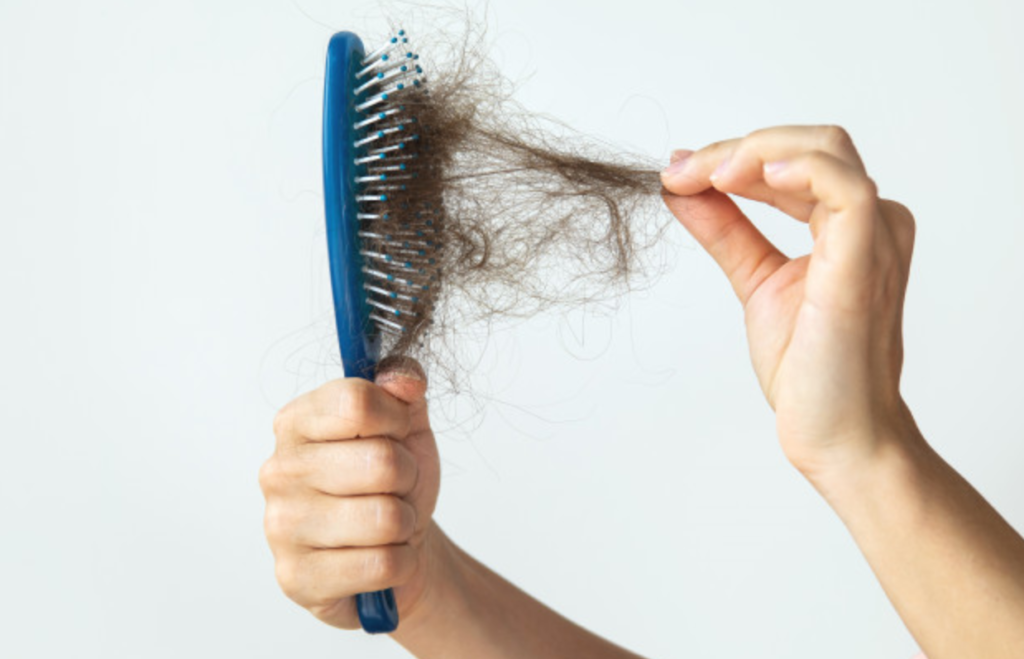Can Vitamins Cause Hair Loss? Other Nutrient Deficiencies Might Cause Hair Loss?
Disclaimer: The Exquisite Find Hair Blog is a hair blog, all of the opinions and information in this article Can Vitamins Cause Hair Loss and Other Nutrient Deficiencies Might Cause Hair Loss are not to be taken as medical advice but simply read for educational purposes.
Can vitamins cause hair loss?
Hair is an afterthought when it comes to overall physical health. If the body needs to focus its energy and blood flow elsewhere, then the hair is neglected and the after effects can be hair loss or thinning.
But not to worry! We will discuss some possible causes of hair loss, vitamin deficiency may not be the issue, or it may be as simple as consuming too many of one kind of vitamin.

What Vitamin Deficiency Causes Hair Loss?
By all means, don’t stop taking vitamins! But everything in its proper proportion maintains balance.
Deficiency to vitamins D, zinc, selenium, and iron can lead to hair loss and thinning hair.
Vitamin D enriches the hair follicles, keeping them healthy, fed, and clean.
Zinc helps heal wounds and makes collagen- a protein found in the skin- so when you scratch your scalp or brush your hair, you create tiny lesions on the scalp. If there is a deficiency to processing or in consuming enough zinc it can lead to hair thinning. Though zinc does not increase hair growth, it helps the follicles remain healthy to continue growing more hair.
Selenium is a natural element often found in foods and is included in most supplements as an enzyme and to help prevent fungus in the body and on the skin. It is often found in dandruff treatment shampoos. Selenium is also an important component to promote good thyroid health. If the thyroid is having trouble, that will often lead to hair thinning.
Iron in the body oxidizes blood cells. Hair grows from blood flow and healthy blood. So if there is a deficiency of iron storage, the blood has trouble producing hemoglobin. Hemoglobin carries oxygen and other nutrients throughout the body and to the follicles. Oftentimes anemia and other iron deficient disorders are present in the body, this is a factor to thinning hair.
Vitamin Deficiency should NOT be self-diagnosed!
If you are having trouble with any of these vitamins, do not try to consume extra of these vitamins, lack of these supplements may not be the issue and you may not have a deficiency of processing these vitamins, there may be an underlying issue. Please see a doctor for simple blood tests to see if you have a deficiency or if there is something else to be concerned about.

The Difference Between Vitamin Deficiency and Consuming Excess of these Vitamins
Vitamin Deficiency means that your body has trouble processing certain vitamins or distributing them to the right systems. But it might not be a lack of enough of the vitamin, but in fact, might even be too much of the supplement in your system that your body is struggling to get rid of the excess. Thus causing other issues that you can see the effects of on top of your head.
According to medical research, vitamins A and E, if taken in excess are the most commonly linked to hair loss.
Vitamin A promotes vision health and blood cell production, as well as contains antioxidant properties. Again, hair is grown from healthy blood and blood flow to the scalp, so if there is too much in the system, it can remove too much oxygen from the blood cells, discouraging growth.
If you consume too much vitamin A, it can cause other severe issues in the body. The hair would definitely be an afterthought at that point. But like I said before, everything if balanced, is good.
Vitamin E is very important for skin health. If the skin is healthy, it can detox properly and can aid in follicle health. But if too much vitamin E is consumed it can cause blood thinning, which is bad for overall health (of course) but also bad for hair growth since the hair growth comes from the blood.
Exceeding Recommended Dosage Guidelines
On most supplement bottles there is a recommended dosage. And every bottle advises to consult a doctor before consuming the contents.
If you exceed the recommended dosage of vitamins it can lead to hair loss and other physical issues due to overdosing on supplements.

Treating Hair Loss and Vitamin Deficiency
Again, it is very important to not self-diagnose deficiency and to see a doctor for basic blood testing to see if you do actually have a deficiency or if it might be the opposite and you are taking too much of one kind of vitamin.
If a deficiency is truly the case, the doctor will have a simple solution that will solve the issue. I had this testing done several years ago and have not had any issues since. The change was like night and day!
To treat hair loss I highly recommend trying out Nioxin hair products. Nioxin is a cleansing and conditioning treatment that was originally designed for chemo patients to encourage and create a healthy environment for hair growth. However it does not grow hair that has already been lost.
What Vitamins Help Hair Growth?
Consuming the right amounts of nutritional daily supplements will help overall body health and in turn hair health.
But the vitamins that specifically encourage hair growth are biotin, which is also known as vitamin B7. And it also is good for the metabolism, digestive track, and the nerves.
Vitamins B6, and B12 also are a big deal when it comes to growing hair.
B6 is also very important for the metabolism and nerves, while B12 contains important enzymes that make more blood cells.
Folic acid is also an important vitamin for hair growth because of its blood making properties in the body.
Like we talked about before, without healthy blood and good blood circulation, the hair suffers.
What OTHER Factors can Cause Hair Loss?

If It’s Not Vitamins Causing Hair Loss…
There are a number of reasons that the hair might be thinning. Other medications, stress, or hormone fluctuations definitely have an effect when it comes to possible hair loss causes.
Other possible causes for hair loss might include –
- Genetics
- Alopecia Areata
- Weight Loss
- Bad Hair Products
- Protein deficiency
- Pregnancy or Hormone Changes
- Stress
- Illness
- Styling your hair too tightly
- Different Medications
If you are seriously concerned about your hair health and the amount of hair that you are losing, please schedule an appointment with your doctor.
Hair loss is normal! It is typical for 7-100 strands to be lost every single day and are being replaced all the time!
FAQs for Can Vitamins Cause Hair Loss?
Does vitamin C cause hair loss?
Excess of any vitamin can have alternate negative effects on the body. And like mentioned above, hair is an afterthought when it comes to overall physical health.
Everything in balance. Regular daily supplements of vitamin C will not cause hair loss. Excess may cause other physical effects that can ripple effect to the hair.
Does zinc cause hair loss?
Zinc does not increase hair growth, it helps the follicles remain healthy through making collagen in the blood to help the body to continue growing more hair.
Why am I suddenly losing lots of hair?
Losing hair can be a symptom of any number of things. However losing hair is also normal. If you are losing more than 100 strands of hair on a daily basis and can mean that there is another underlying issue. At that point you should see a doctor to see if there is an issue that needs to be addressed.
45 Ideas, Causes, Solutions, & Hairstyles for Thinning Hair
How to Shampoo Your Hair to Prevent Hair Loss
Can Shampoo Cause Hair Loss? Toxic Ingredient List
Top 10 Hair Care Tips and Tricks for Best Hair Care at Home
How to Grow Hair Fast – Best Hair Mask for All Hair Types
Does Drinking Water Help Hair Growth?
Disclaimer: The Exquisite Find Hair Blog is a hair blog, all of the opinions and information in Can Vitamins Cause Hair Loss are not to be taken as medical advice but simply for educational purposes.

